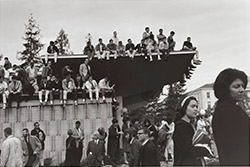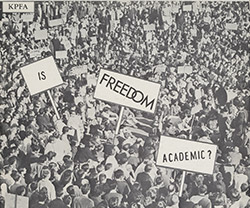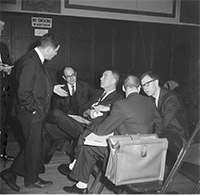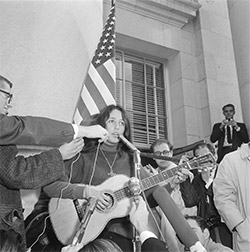About the project
In the fall of 1964, the Berkeley campus of the University of California was rocked by the Free Speech Movement. These interviews recount the experiences of a cross section of participants in or witness to the events, including: student leaders and the lawyers who defended those disciplined and arrested; faculty who were in favor of and others who vehemently opposed FSM; ordinary students who as one freshman noted, were “trying to figure out what was going on. People were really caught by how important this was and trying to sort out the adult world response to it. You knew that this was a big deal.” Because of repeated massive demonstrations — 10,000 students surrounding a police car in the middle of Sproul Plaza; 800 people occupying the central administration building — Berkeley drew national attention. In the words of one interviewee, a journalist who covered the FSM for the nationwide Collegiate Press News Service: “FSM opened up everything — just blew out the tubes of being able to move large amounts of information across the country. It wasn’t exactly that Berkeley was the first place where this mechanism kicked in [political protest] but it was the place where it went critical.”
The Free Speech Movement Oral History Project consists of nearly fifty interviews — most are available here, but some are still in process. Interviews were conducted by Lisa Rubens, a historian and longtime interviewer for the Regional Oral History Office, between 1999 and 2001, after extensive meetings with an advisory committee. Dr. Rubens was also a student at Berkeley during the FSM and had been a witness to many of the major events of that movement. The project was funded by Stephen M. Silberstein as part of his generous gift to UC Berkeley for creating an FSM archive at The Bancroft Library and building the Free Speech Movement Café to honor Mario Savio and commemorate the movement.
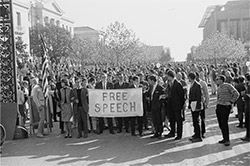
The primary goal for these interviews was to fill in information about the history of the movement that remained undocumented. We wanted interviewees to talk about issues that had not surfaced in contemporary accounts — for example, the role of race and gender within the movement itself. We wanted to record the story of leaders who had not been interviewed previously, and to have them reflect on the interpersonal and social dynamics that influenced decision-making, in addition to the political and tactical issues that were discussed.
We were particularly eager to interview “the troops” — students who volunteered to perform the myriad of seemingly mundane yet critical tasks, including those who typed the position papers and ran the ditto machines in an era before photo-copying, those who secured the amplification system used during the sometimes daily information and action rallies, or those who managed the housekeeping tasks for members of the FSM Steering Committee and the movement itself. We looked for interview subjects who could comment on the wide variety of activism that the movement engendered: The student who was sympathetic but who could tolerate attending only some of the rallies and missing only a few classes when a strike was called; the journalist who had not considered Berkeley a part of the student movement until FSM; members of SLATE, the radical student organization that had fought with the university since 1962, and now watched a new generation of leaders emerge; the junior professor who was one of a small minority in his department who voted to support the FSM; a university staff employee who felt compelled to take a stand. Associated Student Body President, Charlie Powell, who had never been interviewed before, is also a part of this collection. His narrative sheds light on the personal ordeal of leadership and the contingency of power.
The project sought to find subjects who represented the wide spectrum of political belief, as reflected in organizations which composed the FSM Executive Committee. This remains one of the least developed parts of the story and should be pursued. Inevitably an undertaking of this scope veers from its carefully mapped strategy and follows a seemingly un-plotted course. Sometimes an interviewee was selected because they had a good story to tell. Sometimes they were selected because they were currently engaged in activities that illustrated the continuities between FSM and contemporary social activism.
Another area of inquiry was the relationship between faculty and students during the movement. One of the many topics of discourse during the FSM was the size and mandate of the University of California and the need for educational reform. President Clark Kerr’s book, The Uses of the Multiversity, and the perceived intransigence and impersonalization of the administrations both for the university system-wide and at UC Berkeley, were widely criticized. For many, the FSM initiated a period of intense questioning of all aspects of their lives. Many students met with their professors and teaching assistants formally and informally to talk about the relationship of their studies to the events taking place on the campus, about the nature of education and citizenship and the function of civil protest. Faculty and graduate students in the departments of Political Science, History, and Sociology were chosen to illuminate these exchanges, because they represented some, but by no means all, of the more articulate and engaged members of the campus community. We also interviewed a faculty member who opposed the movement: Robert Scalapino, Department of Political Science, who chaired the Council of Departmental Chairmen and the University Forum at the Greek Theatre the day after the mass arrests. And we have included as well, undergraduate students who were episodic in their attention to the issues as well as their participation in the events that constituted the FSM. These are particularly useful for illuminating the multiplicity of concerns students had, the moral fervor that drove them, and for some, how they came to think of themselves as citizens.
The lawyers who defended over 800 students arrested during the occupation of U.C. Berkeley’s Administration Hall, Dec. 2-3, 1964, had never been interviewed. At the time, this was the largest mass arrest in California history. As the news of the occupation and arrests spread, many lawyers came to Sproul Hall and to Santa Rita County Jail where the students were charged and booked, to volunteer their services. The legal defense was long and complicated and ably led by a team of six attorneys. Sadly, just as this project got underway, one of the attorneys, Stanley Black, died. Black had been the former law partner of Superior Court Judge Rupert J. Crittenden, who presided over the first trial. Some of the lawyers indicated that Black was picked in order to elicit the support of the judge. In the course of conducting these interviews, Attorney Malcom Burnstein made available the letters of arrestees written to Judge Crittenden, at the judge’s request, explaining their reason for occupying Sproul Hall. Now deposited in the FSM archives in The Bancroft Library, these letters are among the most immediate testimony and summary of participants’ beliefs even though they were written three years after the actual event.
The majority of interviews were conducted at the interviewee’s place of work or home. Most of the interviews were recorded in one session of an hour and a half in length; some went longer; others included two sessions. Usually interviews began with the interviewee telling where they were located in September 1964. This was followed by questions eliciting how they encountered, reacted to, and/or participated in the FSM. While none of these are life histories, questions about what factors in their background may have shaped their response to FSM are pursued.
These interviews provide insights into how students, staff, and faculty became engaged in a battle with the university and formed a movement to struggle for their civil right to advocate political action in the larger community as well as on the campus. They offer reflections on the academic, cultural, and social climate at the university in the years leading up to and following that fateful fall term of 1964. They situate the Free Speech Movement in the context of larger political issues and social movements that preceded the movement, such as the Civil Rights Movement and the Loyalty Oath controversy, and those which came after, such as the anti-Vietnam War activism.
These interviews are not intended to provide a definitive history of the Free Speech Movement. They were conceived as a way to augment other forms of documentation. The number of interviews conducted was determined by the overall budget. In aggregate, and on their own, they offer a social memory and provide first person documentation of an important milestone in the history of the University of California and the Berkeley Campus, in the political life of California, and in the history of social activism in the United States. Beyond documenting what happened and how, these interviews reveal the personal qualities and skills and the array of background experiences and political consciousness that shaped how people responded to the crisis. They offer a glimpse, as well, into the intellectual, social, and cultural currents of the time — to be sure filtered by dramatic changes in subsequent history and distilled by individual the idiosyncratic nature of remembrance.
Advisory committee (2004)
- Lynn Savio, FSM Veteran, Board Member, FSM-Archive, widow of Mario Savio
- Susan Druding, FSM Veteran and Board Member, FSM-Archive
- Waldo Martin, Professor of History, UCB
- Michael Rossman, FSM Veteran and Board Member, FSM-Archive
- Lisa Rubens, Historian, ROHO, Oral History Project of FSM Digital Archives
- Elizabeth Stephens, Archivist, The Bancroft Library, FSM Digital Archives
- Li Chi Wang, Professor, Ethnic Studies, UCB
- David Wellman, Professor, Department of Community Studies, UC Santa Cruz
- Reginald Zelnik, Department of History, UCB
Project resources
Select bibliography
Berkeley in the Sixties by Mark Kitchell [Documentary]
Freedom's Orator by Robert Cohen and Reginald Zelnik
The Free Speech Movement: coming of age in the 1960s by David Goines
Subversives: The FBI's War on Student Radicals and the Rise of Ronald Reagan by Seth Rosenfield
Related resources
The Free Speech Movement Digital Archive
